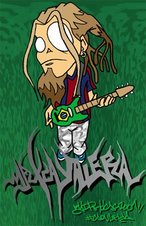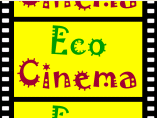

Preceded by a variety of protopunk music of the 1960s and early 1970s, punk rock developed between 1974 and 1976 in the United States, the United Kingdom, and Australia, where groups such as the Ramones, Sex Pistols, and The Clash were recognized as the vanguard of a new musical movement. By 1977, punk was spreading around the world.
Crass was an English anarchist punk rock band, formed in 1977 and based around Dial House, an open house community near Epping, Essex. Whereas the Sex Pistols might have mentioned 'anarchy' for shock value (thereby furthering the common misconception that it is simply a synonym for chaos), Crass actually promoted genuine anarchism as a legitimate political ideology, way of living, and as a resistance movement, popularizing the seminal peace punk movement and touching on such overtly political issues as anti-consumerism, direct action, animal rights, feminism, anti-war, anti-corporatism, environmentalism, anti-globalization, anti-racism, squatting, and the separation of church and state.
Taking literally the punk manifesto of "Do It Yourself", Crass combined the use of sound collage, graphics, song, film, and subversion to launch a sustained and innovative critical broadside against all that they saw as a culture built on foundations of war, violence, sexism, prejudice, capitalism, religious hypocrisy and unthinking consumerism. They were also critical of what they perceived as the flaws of the punk movement itself, as well as wider youth culture in general. Crass were amongst the progenitors of the anarcho-pacifism that became common in the punk music scene (see also anarcho-punk). Other similar groups were Conflict, Flux of Pink Indians, Subhumans, Poison Girls and Oi Polloi.
See also this post about Crass on Derek Wall’s blog "Another Green World".
Despite the broader punk subculture's reactionary antagonism towards hippies, the ideals of the hippie counterculture were an influence on anarcho-punk.
Some anarcho-punks, notably in North America, have sought to use the electoral process in order to bring their respective areas closer to anarchism, although none of them ran for office as members of an anarchist party. Notable anarcho-punks who have run for office include: Dead Kennedys frontman Jello Biafra for mayor of San Francisco, T.S.O.L. singer Jack Grisham for governor of California and D.O.A. lead singer Joey Shithead. Jello Biafra, argues that humans are not ready for anarchy, and that some form of government is needed until certain social changes are implemented. Many anarcho-punks vote, and several anarcho-punks, such as Propagandhi, Jello Biafra, and Thought Riot have expressed support for Ralph Nader and the Green Party.
03 January, 2008
Punk rock and ecology. The case of Crass and anarcho-pacifism.
Αναρτήθηκε από
candiru - stratis aigaiopelagitis
στις
11:50 AM
![]()
Ετικέτες 70s decade, Crass, punk, views and written texts
Subscribe to:
Post Comments (Atom)




4 comments:
Anarchopunk and Animal Liberation
(Based on the article “Beasts of Burden” by Antagonism Press, GB”)
Issues concerning animals’ welfare and environment are usually related with the so called counter-cultures and tends to be flagged as people tend to deal more with traditional left political actions. This happened for a large number of political activist hippies or anarchopunks that now were absorbed mainly by Labor or Green political parties usually rejecting many of their radical stances.
Since late 70s, anarchopunk movement has driven many young people to form bands and playing simple music, usually of heavy sound and unconventional sociopolitical lyrics, created the DIY (Do-It-Yourself) musical scene and took part to sit-ins, occupations or organized concerts for supporting social or environmental issues.
Ecology, nuclear energy, sexism, multinational corporations, exploiting labor, pollution and animal liberation are only few of the main sociopolitical issues anarchopunk bands deal with. Concerning animal liberation and welfare every band has at least one song concerning vegetarianism, or against hunting and vivisection. All of them support the ecological activism or sabotage by Animal Liberation Front, Earth First and Earth Liberation Front declaring their solidarity to their persecuted members and the extremely stiff sentences as terrorists that face. Also punks were the majority of those who took action to prevent hunting.
Anarchopunks also supported Labor strikes like this of coalminers in England in 1984. But the violence of this strike flagged the peacefull character of punk scene. The anarchopunk newspaper “Class War” adopted more violent language against “class enemy” and more brutal position against the more conservative and “bureaucrats” of conventional organizations for animal welfare. No matter the support of violent political actions, this newspaper didn’t hesitate later to adopt more conventional and of traditional left politics and the animal liberation fall into oblivion from its ideological context. Concequently, anarchopunk movement started to decade and their followers adopted more traditional political actions. No matter that even today the DIY scene still exists, doesn’t have any social impact at all and is limited to political minorities of radical anarchism.
Also, animal liberation lost its radicalism in the left ideological context and now is considered by Left as middle-class or liberal “hobby”.
Anarchopunk and Animal Liberation
(Based on the article “Beasts of Burden” by Antagonism Press, GB”)
In the above article we also read the folloing interesting views:
Traditional anarchists followers of the war of Classes seldom expanded their views beyond a call to the working class to take over the production units, the factory, the slaughterhouses, etc. Consequently, the problem of Mc Donalds was only that it has no democratic ruling and profitable purposes. Anarchopunks, despite their individualist and moral expression, criticize more sufficiently capitalism as a way of life. So, merchandise in supermarkets’ selves or hamburgers are not only what seem to be; anarchopunks traced and accused all the chain of nature, animal and human exploitation that is necessary for their production and their presence in the selves or in our meal. Anarchopunk was also not a call for political action as traditional anarchism, but also a practice for a new parallel, self-organized and alternative way of life, as the DIY scene an amusement away from the exploitation by musical companies, the collective way of life especially in occupation of old neglected houses, etc.
This won't really have success, I believe this way.
This won't actually have effect, I suppose like this.
Post a Comment